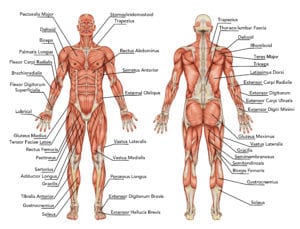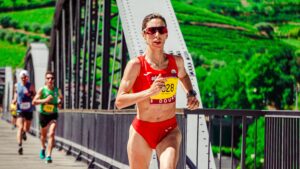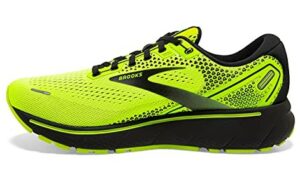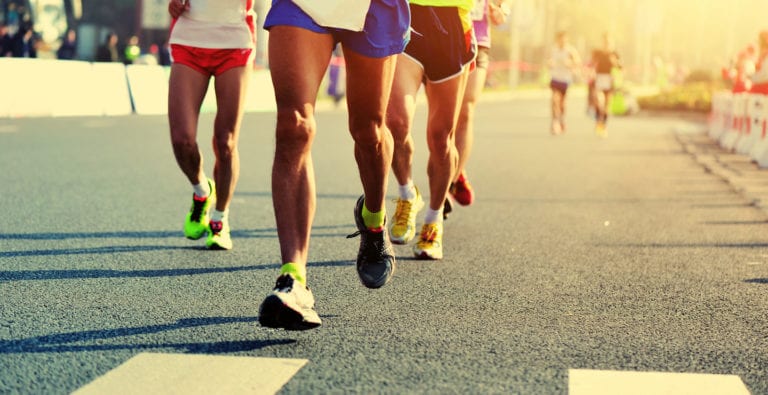As a new runner or a seasoned athlete looking to level up your performance, nutrition for runners is a key area to look into, especially if you have related goals such as losing weight, improving muscle strength, getting lean etc. While there are many diets for athletes, as well as many nutrition trends (from paleo to vegan to low-carb, high-fat diets), it is worth going back to basics and establishing the essential building blocks for good running nutrition.
What is the best nutrition for runners and what should you eat before, during, and after a run? What’s the difference between runners’ diets and what are the best solutions for you?
While there is no one-size-fits-all answer to these questions, the following guide should establish the foundation for best feeding your body during your running training.
Nutrition Essentials for Runners
You don’t need to be a sports nutrition specialist to get your fueling right for running. In theory, for moderately active casual runners, a well-balanced diet including fresh fruits and vegetables, a good mix of protein and carbohydrates, and staying away from ultraprocessed foods should be all you need. However, for some more specific advice especially as you take on endurance events or ramp up your training volume, you’ll need to know a few basic notions in order to optimize your training results, have a good source of energy from food, and avoid any stomach issues during your runs.Understanding macronutrients
The first important notion when it comes to running nutrition is how our food is categorized into macronutrients: protein, carbohydrates and fats. These come from real foods as well as from energy drinks or sports nutrition like bars or gels. Here’s a quick overview. Proteins are the building blocks of muscle and can be found in animal products such as meat, dairy, and eggs, as well as in nuts, seeds, and a multitude of plant sources. An active runner should ensure they have enough protein in their diet to ensure their muscles repair properly after workouts. Additionally, protein ensures muscles develop, burning fat and helping you lose weight and get leaner over time. Carbohydrates are essential for energy, despite the tendency of modern diets to paint them in an unfavorable light. They are the sugars, starches and fibers found in fruits, grains, vegetables and even milk products. The optimal carb intake for an active person is c. 65% of your regular diet, with more emphasis being put on complex carbohydrates which take longer to break down and deliver energy into your system. Great sources of complex carbs include beans, peas, corn, lentils, and whole-grain bread and cereals. By eating complex carbs before your runs, your body will get sustained energy for longer (as opposed to the sugar in simple carbs, which gives you the famous “sugar rush” followed by an energy crash). Fats– the third macronutrient group – also find their place in a healthy diet, helping us absorb vitamins A, D, and E. Fat is a source of important fatty acids that the body cannot create itself and can be part of a balanced diet for a runner, too. During runs, muscles draw on fat stores for energy, so when you’re doing a marathon or more, having adequate deposits is important as an energy source. Moreover, fatty acids like Omega 3 and 6 have been proven to help maintain joint and ligament strength and flexibility, all essential for runners’ performance.What are the best runners’ diets? 6 nutrition tips you need to follow
A balance between protein, carbs and fat is essential for fueling a runner’s body. However, there are many differing views on what a runner should eat in a day, how much of either macronutrient is best for recovery and as energy sources, how sports nutrition products contribute to sports performance, and so on. In recent years, the trend has been to advocate for proper nutrition with “real food” and moving away from an over-reliance on gels, bars and sports drinks. Some professional endurance runners promote vegan and vegetarian diets as a source of their healthy fueling strategy. Others support keto, paleo, or low-carb high-fat nutrition. Ultimately, your choice of diet and how you fuel before, during and after your runs will depend on several factors: health and fitness levels, your desired exercise performance, but also your personal convictions and ethics. Regardless, there are a few running commandments when it comes to food, and they’re easy to follow.1. Get your nutrient timing right
Eating before and after runs can be tricky. You need to start on a relatively full stomach, but without feeling too full so you risk getting a bad stomach or stitches. You should also start well hydrated, so your sweat rate doesn’t outbalance the water percentage levels in your body already. Studies show inconclusive results when it comes to when you should eat before running, but as a good rule of thumb, avoid eating anything 30 minutes before your workout. After running, see our advice below around the perfect recovery window for refueling with carbs and protein. During your run, your body has enough glycogen stores to allow you to perform well for about 2 hours. For longer sessions, the recommended amount is 40-60 grams of carbohydrates per hour, depending on your size.2. Eat a balanced diet from real food
Sports nutrition products such as energy bars, energy chews, gels, etc., are all useful on-the-go solutions for when you’re running a long race and sometimes even in between meals. However, the best nutrition plan relies on real food from a varied array of sources and hitting all the main macronutrient groups described above. A good reference point is to “eat the rainbow” of fruits and vegetables (kale, sweet potato, red bell peppers, tomatoes, cucumbers, spinach, eggplant etc.) while including a good amount of healthy protein from dairy and lean meat, and whole-grain cereals and healthy carbs for energy. To ensure you have the appropriate amount of nutrients from food, try to cook from scratch as much as possible and make food choices that are aligned with your fitness goals. However, don’t become a zealot, either! Allow yourself “cheat days” and make sure you don’t completely exclude any food group unless you have an allergy or dietary requirement causing you to do so. By balancing eating high-quality foods with the odd fast food or treat every now and then, your motivation to reach your fitness goals and ace your next race will stay strong.3. Hydrate appropriately
During exercise, we lose hydration from sweat. Sweat rates vary from person to person and some of us are “salty sweaters” – which means we lose electrolytes that we need to replenish. Additionally, depending on the weather, we may lose more through sweat than we anticipate. This is why, as a runner, you need to hydrate more and pay more attention to what you hydrate with. Ensure you take some salts or drink an electrolyte drink if you’re running more than 90 minutes at a sustained pace. Add some salty food, like pretzels, to your post-run nutrition, too.4. Don’t underestimate pre-run fueling
There are a lot of running trends like fasted running, i.e. going out for training before you’ve eaten anything in the morning. While many claim that fasted running helps improve performance, running economy, and body composition (especially by helping reduce body fat as, in theory, you’ll burn your fat stores for energy), scientific studies have not proven this to be true or false. You could use fasted running in moderation, and only for short, low-intensity recovery sessions if you want to try it in your training plan. However, before a longer run and especially before a race, you should always try to have a good source of carbohydrates for low-release energy, as well as some protein to help fuel your muscles during your session. Great options include a wholegrain bagel with peanut butter, porridge (oatmeal) with honey and berries, or a banana. It’s important to stay away from high-fiber foods to avoid GI distress during your run.5. Eat for recovery
Another golden rule is to always re-fuel after a run. Energy gels and bars may have been your source of energy during a long session, but they only cover some of your carbohydrate needs during effort. Your body still needs to replenish, and for this it needs a mix of carbs and protein (between 4:1 and 2:1 ratio of grams of carbs to protein). Recovery protein powders are great for immediately after exercise, as they’re easy to digest and absorb and have the premixed combination of nutrients you need in the short run. In the long run, proper nutrition from real food, balancing nutrients and offering enough energy to sustain your training are important. Even if you’re looking to lose weight, ensure you have a healthy mix of foods and don’t reduce your calorie intake too drastically, especially during a sustained training program.6. Supplement where necessary
Depending on your dietary requirements or if you’re trying to lose weight, you might not get enough vitamins or minerals in your diet, even if you follow all these recommendations. For example, a high volume of exercise can push your immune system to become more vulnerable, so ensuring you have good amounts of vitamin C sources in your diet is important. Other supplementation needs can include:- Iron (women endurance athletes will need more than men, according to several studies). You can take in iron from lean meat, leafy green vegetables, nuts, shrimp and scallops.
- Calcium to prevent osteoporosis and stress fractures. Good sources of calcium include dairy products, beans and eggs, but you may need to look at supplementing if you’re not getting enough.
- Sodium and other electrolytes as per our hydration advice.
What should a runner eat in a day?
Getting your daily nutrition right can follow a simple pattern around your training run plan. Aim to always fuel appropriately before and after a run, and have a balanced diet throughout the week. Here’s a rough guide on how to organize your food intake for optimal energy supply on a daily basis, assuming you’re training on most days.Fueling before your runs
Most of your training runs will be under 2 hours long, so your glycogen stores should be able to take you through an exercise session without issues. Unless you’re planning to do a fasted run, the best options for a pre-run snack will include a mix of carbs and protein. Our top choices are:- A banana – rich in carbs but also in potassium, which makes it great before a run on hot days (potassium is one of those minerals you lose through sweat, like sodium etc.). Bonus: it’s easy to digest so won’t cause trouble on the run, and it will suit any type of diet!
- Oatmeal – good source of complex carbohydrates, fueling you for longer runs or races. Oats also have a low glycemic index so you won’t get a “sugar high” but a slow, steady release of energy. Oatmeal is a great breakfast for marathon runners and fits into any type of diet as you can prepare it with plant-based milk or even with water as part of a weight loss effort.
- Bagels with peanut butter – slow-release carbs coupled with antioxidant vitamin E from the peanut butter will give you an effective energy boost without the crash. Peanut butter does have a high fat content, but it’s unsaturated fat that helps lower cholesterol blood levels and also contributes to feeling fuller for longer. Finally, you’ll get some good extra protein from peanut butter, helping your muscles kickstart their recovery post-run.


























